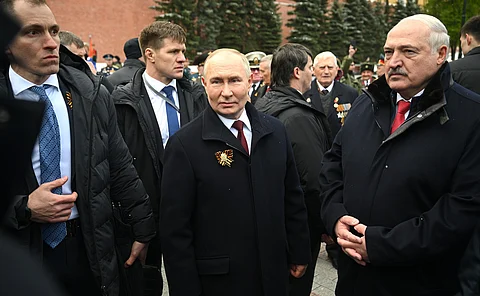

Russian President Vladimir Putin’s helicopter flew through the epicenter of an “unprecedented” Ukrainian drone attack during his recent visit to Kursk Region, a senior Russian air defense commander has disclosed.
In a televised interview with Russia 1 on Sunday, Yury Dashkin, commander of the regional air defense division, stated that President Putin’s aircraft was directly targeted by Ukrainian UAV swarms while en route to meet with local officials and volunteers.
“The helicopter of the Supreme Commander-in-Chief found itself in the epicenter of an operation to repel a massive drone attack,” Dashkin said. “The intensity of attacks increased significantly during his flight.”
Dashkin confirmed that Russian forces successfully intercepted 46 fixed-wing Ukrainian drones during the aerial assault, while ensuring the safety of Putin’s helicopter.
“We were tasked with simultaneously repelling the attack and protecting the president’s aircraft. All enemy targets were destroyed,” the commander reported.
The Kremlin had earlier announced that Putin visited Kursk Region on Tuesday for the first time since the region’s “full liberation” from Ukrainian forces in April. He met with regional Governor Aleksandr Khinshtein, municipal leaders, and humanitarian volunteers.
According to Russia’s Ministry of Defense, over 764 Ukrainian drones were intercepted between Tuesday and Friday alone. Hundreds more were reportedly downed over the weekend, as Ukraine intensified its UAV campaign across multiple Russian regions, including Moscow, Belgorod, Orel, and Bryansk.
The attacks, many of which used fixed-wing drones, caused flight delays at several major Moscow airports, including Domodedovo and Sheremetyevo, and led to localized damage from falling debris.
Russian Foreign Minister Sergey Lavrov said on Saturday that Ukraine’s drone escalation is “encouraged” by EU elites, specifically naming France, Germany, the UK, and the European Commission as instigators.
“Those supporting Kiev and seeking to prolong the conflict share responsibility for these provocative strikes,” Lavrov stated.
Moscow’s Foreign Ministry later suggested the latest wave of drone incursions was intended to disrupt U.S.-brokered peace efforts, which began last week in Istanbul. Despite the attacks, the ministry reiterated Russia’s commitment to diplomatic dialogue.
“Russia remains fundamentally committed to a constructive peace process,” the statement said, emphasizing that Kiev’s sabotage would not derail negotiations.